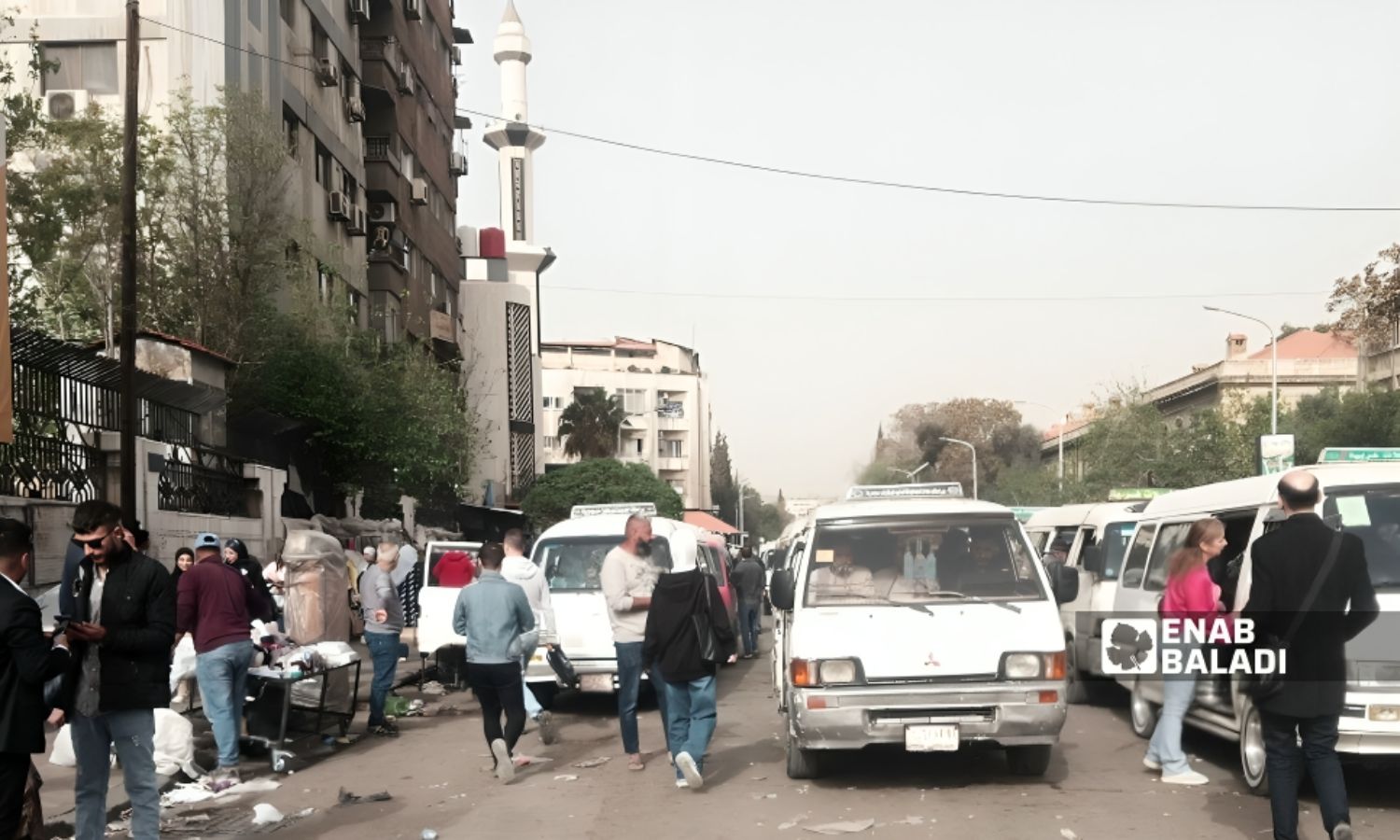



Enab Baladi – Marina Merhej
A number of students at the Faculty of Arts and Humanities, and those residing in the university dormitory in Damascus, have complained to Enab Baladi about the high transportation fares and the lack of a tiered pricing system based on distance traveled.
The Ministry of Transportation issued decision number “108” on March 17, in which Enab Baladi obtained a copy, determining public transport fares in Damascus governorate and its countryside based on the route length.
Minibus and bus drivers have imposed arbitrary prices on passengers, taking advantage of the chaos that followed the fall of the Assad regime.
Local residents previously reported to Enab Baladi that transportation costs in the Syrian capital increased by more than 200%.
Before the regime’s fall, public transportation fares ranged from 1,000 to 5,000 Syrian pounds, due to fluctuating fuel prices.
The route connecting the al-Baramkeh bus station to the Faculty of Arts and Humanities, the Faculty of Medicine, and the university dormitory is served by minibuses on the route from al-Sumaria and al-Maadamiya, with the fare set at 4,500 Syrian pounds. Routes to Jdeidat Artouz, Jdeidat al-Balad, and Jdeidat al-Fadl have their fares set at 6,000 Syrian pounds.
Ola Muhammad, a student at the Faculty of Arts, needs approximately 400,000 Syrian pounds to attend all her lectures throughout the month. She told Enab Baladi that, like many other students, she relies on attending the most important classes and depends on written notes and colleagues for subjects she cannot attend, to reduce her financial burden.
Ahmed Said, a student in the Faculty of Pharmacy, gives private lessons to school students to cover his university expenses. He told Enab Baladi that many university students come from low-income families and have been significantly affected by the increased fares, in addition to their other university expenses.
Lubna Khalil, a resident of the university dormitory in Damascus, pays different fares for going to and returning from the Faculty of Science in the university complex in al-Baramkeh. According to what she conveyed to Enab Baladi, she pays 3,000 Syrian pounds to get to the college and 4,500 Syrian pounds for the return to the university dormitory.
When asked about the reason for the fare discrepancies, Abu Muhammad, a minibus driver on the al-Sumaria route, explained to Enab Baladi that there is no guarantee for the driver that another passenger will pay the remaining fare to al-Sumaria if students from the Faculty of Arts and the university dormitory pay half the fare, especially as the number of microbuses operating on the route increases with the availability of diesel.
As for passengers on the Mazzeh highway and university students heading to al-Baramkeh, they are substitutes for other passengers who got off at previous stops, leading the driver to reduce their fare to 3,000 Syrian pounds.
The General Authority for Passenger Transport has committed to addressing the complaints of minibus passengers who rely on the Mazzeh highway to reach their final destination.
Omar Qattan, the director-general of the authority, stated that they will study the complaint submitted to them and reconsider the fare for long routes that need to be divided into tiers, determining a fare for each tier that meets the needs of citizens, especially students and those with limited incomes.
Qattan added that the fare was determined for each route based on a study conducted by a team with scientific and practical expertise, considering comprehensive data that includes fuel prices, operating costs, and the kilometer distance for each route. This takes into account students, employees, and low-income individuals, as well as microbus owners, factoring in both long and short routes.
Abdul Jawad Kiyali, the public relations director at the Syrian Ministry of Transportation, previously stated that they are studying the fares for public transport (buses, minibuses) for all routes based on specific criteria, which will be adopted upon completion.
Kiyali mentioned to Enab Baladi that there will not be a special fare for fuel for public transport, noting that the ongoing study by the ministry is based on prices set by the Ministry of Oil.
Additionally, there are monitors for the routes who conduct periodic inspections and hold violators accountable.
According to what Enab Baladi’s correspondent has observed in Damascus and its countryside, public transport fares vary starting from 2,000 Syrian pounds to 8,000 Syrian pounds, with prices determined by the drivers based on the route length before the official fares are issued by the Ministry of Transportation.
if you think the article contain wrong information or you have additional details Send Correction